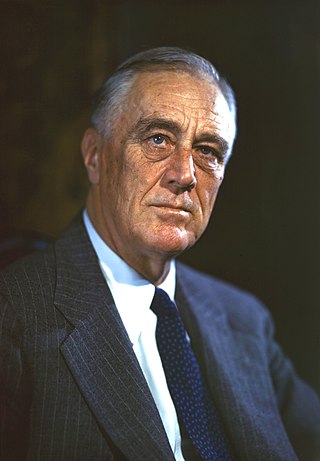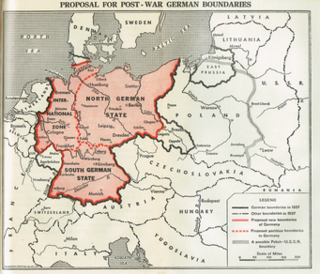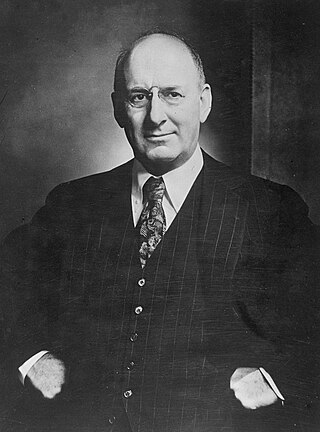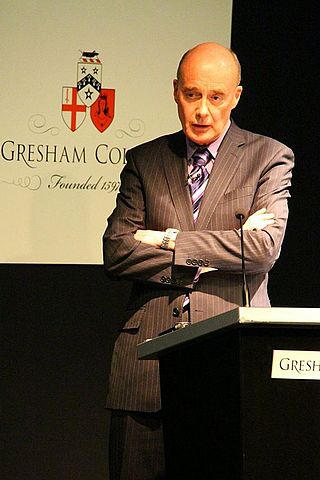Related Research Articles

Franklin Delano Roosevelt, commonly known as FDR, was an American statesman and politician who served as the 32nd president of the United States from 1933 until his death in 1945. Roosevelt directed the federal government during most of the Great Depression, implementing the New Deal in response to the worst economic crisis in American history. He also built the New Deal coalition, realigning American politics into the Fifth Party System and defining American liberalism throughout the middle third of the 20th century. His third and fourth terms were dominated by World War II.
The Neutrality Acts were a series of acts passed by the US Congress in 1935, 1936, 1937, and 1939 in response to the growing threats and wars that led to World War II. They were spurred by the growth in isolationism and non-interventionism in the US following the US joining World War I, and they sought to ensure that the US would not become entangled again in foreign conflicts.

Lend-Lease, formally the Lend-Lease Act and introduced as An Act to Promote the Defense of the United States, was a policy under which the United States supplied the United Kingdom, the Soviet Union, France, China, and other Allied nations with food, oil, and materiel between 1941 and 1945. The aid was given free of charge on the basis that such help was essential for the defense of the United States.

Henry Lewis Stimson was an American statesman, lawyer, and Republican Party politician. Over his long career, he emerged as a leading figure in U.S. foreign policy by serving in both Republican and Democratic administrations. He served as Secretary of War (1911–1913) under President William Howard Taft, Secretary of State (1929–1933) under President Herbert Hoover, and again Secretary of War (1940–1945) under Presidents Franklin D. Roosevelt and Harry S. Truman, overseeing American military efforts during World War II.

The Yalta Conference, held 4–11 February 1945, was the World War II meeting of the heads of government of the United States, the United Kingdom and the Soviet Union to discuss the postwar reorganization of Germany and Europe. The three states were represented by President Franklin D. Roosevelt, Prime Minister Winston Churchill, and General Secretary Joseph Stalin. The conference was held near Yalta in Crimea, Soviet Union, within the Livadia, Yusupov, and Vorontsov palaces.

The Atlantic Charter was a statement issued on 14 August 1941 that set out American and British goals for the world after the end of World War II, months before the US entered the war. The joint statement, later dubbed the Atlantic Charter, outlined the aims of the United States and the United Kingdom for the postwar world as follows: no territorial aggrandizement, no territorial changes made against the wishes of the people (self-determination), restoration of self-government to those deprived of it, reduction of trade restrictions, global co-operation to secure better economic and social conditions for all, freedom from fear and want, freedom of the seas, abandonment of the use of force, and disarmament of aggressor nations. The charter's adherents signed the Declaration by United Nations on 1 January 1942, which was the basis for the modern United Nations.

Cordell Hull was an American politician from Tennessee and the longest-serving U.S. Secretary of State, holding the position for 11 years (1933–1944) in the administration of President Franklin Delano Roosevelt during most of World War II. Before that appointment, Hull represented Tennessee for two years in the United States Senate and 22 years in the House of Representatives.

The Morgenthau Plan was a proposal to weaken Germany following World War II by eliminating its arms industry and removing or destroying other key industries basic to military strength. This included the removal or destruction of all industrial plants and equipment in the Ruhr. It was first proposed by United States Secretary of the Treasury Henry Morgenthau Jr. in a 1944 memorandum entitled Suggested Post-Surrender Program for Germany.

The Cold War originated in the breakdown of relations between the two main victors in World War II: United States and the Soviet Union, and their respective allies, the Western Bloc and the Eastern Bloc, in the years 1945–1949.

Harold "Harry" Lloyd Hopkins was an American statesman, public administrator, and presidential advisor. A trusted deputy to President Franklin Delano Roosevelt, Hopkins directed New Deal relief programs before serving as the eighth United States secretary of commerce from 1938 to 1940 and as Roosevelt's chief foreign policy advisor and liaison to Allied leaders during World War II. During his career, Hopkins supervised the New York Temporary Emergency Relief Administration, the Federal Emergency Relief Administration, the Civil Works Administration, and the Works Progress Administration, which he built into the largest employer in the United States. He later oversaw the $50 billion Lend-Lease program of military aid to the Allies and, as Roosevelt's personal envoy, played a pivotal role in shaping the alliance between the United States and the United Kingdom.

Henry Morgenthau Jr. was the United States Secretary of the Treasury during most of the administration of Franklin D. Roosevelt. He played a major role in designing and financing the New Deal. After 1937, while still in charge of the Treasury, he played the central role in financing United States participation in World War II. He also played an increasingly major role in shaping foreign policy, especially with respect to Lend-Lease, support for China, helping Jewish refugees, and proposing measures to deindustrialise Germany.

The Second Quebec Conference was a high-level military conference held during World War II by the British and American governments. The conference was held in Quebec City, September 12 – September 16, 1944, and was the second conference to be held in Quebec, after "QUADRANT" in August 1943. The chief representatives were Winston Churchill, Franklin D. Roosevelt and the Combined Chiefs of Staff. Canada's Prime Minister William Lyon Mackenzie King was the host but did not attend the key meetings.

The "Four Policemen" was a postwar council with the Big Four that US President Franklin Roosevelt proposed as a guarantor of world peace. Their members were called the Four Powers during World War II and were the four major Allies of World War II: the United Kingdom, the United States, the Soviet Union, and China. Roosevelt repeatedly used the term "Four Policemen" starting in 1942.

David Reynolds, is a British historian. He is Emeritus Professor of International History at Cambridge University and a Fellow of Christ's College, Cambridge. He attended school at Dulwich College on a scholarship and studied at Cambridge and Harvard Universities. He has held visiting posts at Harvard, Nebraska and Oklahoma, as well as at Nihon University in Tokyo and Sciences Po in Paris.

Germany is Our Problem is a book written in 1945 by Henry Morgenthau Jr., U.S. Secretary of the Treasury during the administration of Franklin D. Roosevelt. In the book he describes and promotes a plan – named after him – for the occupation of Germany after World War II.

The Combined Munitions Assignments Board was a major government agency for the U.S. and Britain in World War II. With Harry Hopkins, Roosevelt's top advisor in charge, it took control of the allocation of war supplies and Lend lease aid to the Allies, especially Britain and the Soviet Union.
This bibliography of Franklin D. Roosevelt is a selective list of scholarly works about Franklin D. Roosevelt, the thirty-second president of the United States (1933–1945).

The UK-US relations in World War II comprised an extensive and highly complex relationships, in terms of diplomacy, military action, financing, and supplies. British Prime Minister Winston Churchill and American President Franklin D. Roosevelt formed close personal ties, that operated apart from their respective diplomatic and military organizations.

The third presidential term of Franklin D. Roosevelt began on January 20, 1941, when he was once again inaugurated as the 32nd president of the United States, and the fourth term of his presidency ended with his death on April 12, 1945. Roosevelt won a third term by defeating Republican nominee Wendell Willkie in the 1940 United States presidential election. He remains the only president to serve for more than two terms. Unlike his first two terms, Roosevelt's third and fourth terms were dominated by foreign policy concerns, as the United States became involved in World War II in December 1941.
The foreign policy of the United States was controlled personally by Franklin D. Roosevelt during his first and second and third and fourth terms as the president of the United States from 1933 to 1945. He depended heavily on Henry Morgenthau Jr., Sumner Welles, and Harry Hopkins. Meanwhile, Secretary of State Cordell Hull handled routine matters. Roosevelt was an internationalist, while powerful members of Congress favored more isolationist solutions in order to keep the U.S. out of European wars. There was considerable tension before the Attack on Pearl Harbor in December 1941 converted the isolationists or made them irrelevant. The US began aid to the Soviet Union after Germany invaded it in June 1941. After the US declared war in December 1941, key decisions were made at the highest level by Roosevelt, Britain's Winston Churchill and the Soviet Union's Joseph Stalin, along with their top aides. After 1938 Washington's policy was to help China in its war against Japan, including cutting off money and oil to Japan. While isolationism was powerful regarding Europe, American public and elite opinion strongly opposed Japan.
References
- ↑ "Warren F. Kimball". Rutgers SASN. Retrieved 31 January 2022.
- ↑ Kimball, Warren F. (May 15, 2020). "Warren F. Kimball on Learning the Scholar's Craft: Reflections of Historians and International Relations Scholars". H-Diplo.
- ↑ Kimball, Warren F. (January 1985). "Naked Reverse Right: Roosevelt, Churchill, and Eastern Europe from TOLSTOY to Yalta-and a Little Beyond*". Diplomatic History. 9 (1): 1–24. doi:10.1111/j.1467-7709.1985.tb00519.x.
- ↑ Hogan, Michael J. (2000). Paths to Power: The Historiography of American Foreign Relations to 1941. Cambridge University Press. p. 232. ISBN 978-0-521-66413-4.
- ↑ Pederson, William D. (21 March 2011). A Companion to Franklin D. Roosevelt. John Wiley & Sons. p. 406. ISBN 978-1-4443-9517-4.
- ↑ Beisner, Robert L. (2003). American Foreign Relations Since 1600: A Guide to the Literature. ABC-CLIO. p. 967. ISBN 978-1-57607-080-2.
- ↑ Dietrich, John (2013). The Morgenthau Plan: Soviet Influence on American Postwar Policy. Algora Publishing. p. 53. ISBN 978-1-62894-020-6.
- ↑ Olick, Jeffrey K. (September 2005). In the House of the Hangman: The Agonies of German Defeat, 1943-1949. University of Chicago Press. p. 91. ISBN 978-0-226-62638-3.
- ↑ Dobson, Alan P. (25 April 2002). US Economic Statecraft for Survival, 1933-1991: Of Sanctions, Embargoes and Economic Warfare. Routledge. p. 294. ISBN 978-1-134-46078-6.
- ↑ Warren F. Kimball (2013). "Introduction". Journal of Transatlantic Studies (Volume 11, Issue 3 ed.). Springer Publishing. pp. 231–233.
The politics of the players raised barriers - from European/white guilt to the exaggerated, I would argue, argument that imperialism 'caused' the failed-state syndrome that afflicts so much of the post-colonial world.
- ↑ Karski, Jan (March 1970). "WARREN F. KIMBALL. The Most Unsordid Act: Lend-Lease, 1939-1941. Pp. ix, 281. Baltimore: Johns Hopkins Press, 1969. $7.50". The Annals of the American Academy of Political and Social Science. 388 (1): 147. doi:10.1177/000271627038800116. S2CID 144181920.
- ↑ Reviews include:
- Brands, H. W. (April 1992). "Warren F. Kimball. The Juggler: Franklin Roosevelt as Wartime Statesman. Princeton: Princeton University Press. 1991. Pp. xii, 304. $19.95". The American Historical Review. 97 (2): 639–640. doi:10.1086/ahr/97.2.639.
- van Tol, Jan (1993). "The Juggler: Franklin Roosevelt and Wartime Statesman (review)". Naval War College Review. 46 (2).
- ↑ Reviews include:
- van Tol, Jan (2000). "Forged in War: Roosevelt, Churchill, and the Second World War". Naval War College Review. 53 (3).
- Hendrickson, David C. (November–December 1997). "Forged in War: Roosevelt, Churchill, and the Second World War (review)". Foreign Policy. Retrieved February 28, 2022.
- Dolan, Chris J. (2004). "Forged in War: Roosevelt, Churchill, and the Second World War (review)". White House Studies. 4 (4).